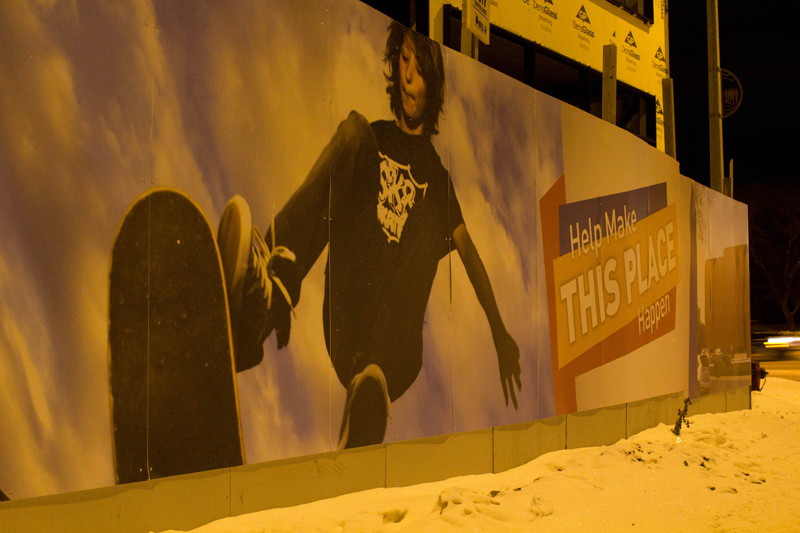Grassroots activists slam Youth for Christ once more
Pastor says the organization will bring hope to a bleak community
“God raped Mary.”
That was the message many Winnipeggers received over the holidays as posters by an anonymous, anti-Christian group cropped up in downtown Winnipeg, sparking controversy throughout the community.
The posters, which were signed “Youth Against Christ,” were conveying a pro-choice message. They were also meant to criticize Youth for Christ (YFC), an organization that was recently awarded $3.2 million by the city to fund a massive, $13.2 million recreation centre for inner-city youth.
The posters depict Mary being led by Joseph to a women’s health centre with the accompanying statement, “We wish you a pro-choice because God raped Mary Christmas.”
The posters have sparked the ire of some Christians, including YFC executive director John Courtney, who publicly decried the action as a possible hate crime.
Others, however, see merit in the “larger message” of the posters.
Lissie Rappaport is an urban and inner cities studies student at the University of Winnipeg. She is a feminist activist and has worked for several community centres in the inner city.
“The centre is a clear example of the Christian right” and its influence on politics in Canada, Rappaport said of Youth for Christ.
The centre should never have been given public money to proselytize to aboriginal youth, she added.
Rappaport noted that the federal government contributed $3.2 million to the Youth for Christ centre, while Sisters in Spirit, an organization dedicated to bringing attention to the violence against aboriginal women, had its funding for a missing and murdered women database cut.
“ Telling people that their identity (or culture) is a problem, that there is something wrong with them and they need to change it, is not how a community organization should ... operate.
Lukas Thiessen, founding member, Atheist Students Association
Additionally, funding for the Aboriginal Healing Foundation, which provides counselling and other services to survivors of residential schools and their families, ended completely last year.
“Community-based organizations need more funding,” Rappaport stated.
She believes that the Youth for Christ Centre is reminiscent of the Indian residential school system that plagued aboriginals from the late 1800s until the 1960s.
The organization ultimately wants aboriginal youth to discard their culture in favour of Christianity, she said. (YFC’s Courtney could not be reached for comment.)
Lukas Thiessen, founding member of the Atheist Students Association at the University of Winnipeg, doesn’t concur with Rappaport’s overall position, but does agree that aboriginals should be able to retain their culture while still accessing essential community programming.
“Telling people that their identity (or culture) is a problem, that there is something wrong with them and they need to change it, is not how a community organization should ... operate,” he said.
Chris Lenshyn is an associate pastor with responsibilities in youth ministry at the Sargent Avenue Mennonite Church in downtown Winnipeg.
“I certainly don’t think it (the centre) is a step back to colonialism,” he said. “Their message is one of peace and hope and joy, and if Youth for Christ wants to step into a place that lacks those things, it should be supported.”
He added that the message of Christ is an uplifting one and that Youth for Christ practices the social gospel.
They do not believe in superiority over the youth they work with, as the officials of oppressive residential schools once did, according to Lenshyn.
Members of the organization walk with the underprivileged and understand their daily struggles, he said.
“There’s hope in a place like Youth for Christ.”
Published in Volume 65, Number 16 of The Uniter (January 20, 2011)








